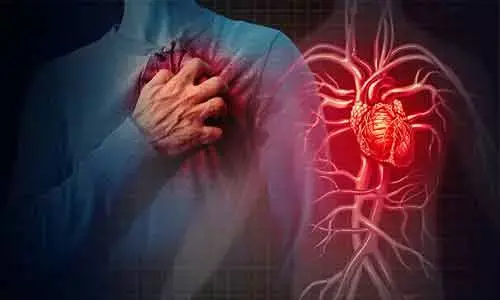- Home
- Medical news & Guidelines
- Anesthesiology
- Cardiology and CTVS
- Critical Care
- Dentistry
- Dermatology
- Diabetes and Endocrinology
- ENT
- Gastroenterology
- Medicine
- Nephrology
- Neurology
- Obstretics-Gynaecology
- Oncology
- Ophthalmology
- Orthopaedics
- Pediatrics-Neonatology
- Psychiatry
- Pulmonology
- Radiology
- Surgery
- Urology
- Laboratory Medicine
- Diet
- Nursing
- Paramedical
- Physiotherapy
- Health news
- Fact Check
- Bone Health Fact Check
- Brain Health Fact Check
- Cancer Related Fact Check
- Child Care Fact Check
- Dental and oral health fact check
- Diabetes and metabolic health fact check
- Diet and Nutrition Fact Check
- Eye and ENT Care Fact Check
- Fitness fact check
- Gut health fact check
- Heart health fact check
- Kidney health fact check
- Medical education fact check
- Men's health fact check
- Respiratory fact check
- Skin and hair care fact check
- Vaccine and Immunization fact check
- Women's health fact check
- AYUSH
- State News
- Andaman and Nicobar Islands
- Andhra Pradesh
- Arunachal Pradesh
- Assam
- Bihar
- Chandigarh
- Chattisgarh
- Dadra and Nagar Haveli
- Daman and Diu
- Delhi
- Goa
- Gujarat
- Haryana
- Himachal Pradesh
- Jammu & Kashmir
- Jharkhand
- Karnataka
- Kerala
- Ladakh
- Lakshadweep
- Madhya Pradesh
- Maharashtra
- Manipur
- Meghalaya
- Mizoram
- Nagaland
- Odisha
- Puducherry
- Punjab
- Rajasthan
- Sikkim
- Tamil Nadu
- Telangana
- Tripura
- Uttar Pradesh
- Uttrakhand
- West Bengal
- Medical Education
- Industry
Cardiac MRI may not help diagnose heart failure, finds study

US: Cardiovascular imaging is being considered as the key to the assessment of patients with heart failure. It plays an established role in the assessment of patients with suspected and confirmed heart failure syndromes, in particular identifying aetiology. But a new study conducted by the researchers at the University of Alberta casts doubt on the standard practice of using magnetic resonance imaging (MRI) in diagnosing heart failure.
The study was published in the journal Circulation, which included 500 patients with nonischemic heart failure. They were classified randomly to routine versus selective CMR.
Patients in the routine strategy underwent echocardiography and CMR, whereas those assigned to selective use underwent echocardiography with or without CMR according to the clinical presentation. HF causes were classified from the imaging data as well as by the treating physician at 3 months (primary outcome). Clinical events were collected for 12 months.
The resulting outcome was that
1)out of 500 patients (344 male) with mean age 59±13 years who were randomized, the routine and selective CMR strategies had similar rates of specific HF causes at 3 months clinical follow-up ie. 44% versus 50%, respectively.
2)At image interpretation, rates of specific HF causes were also not different between routine and selective CMR (34% versus 30%), respectively
"As far as we could tell, the routine MRIs didn't add any value to the diagnosis," stated Ian Paterson, a professor of medicine and the study's principal investigator."While there may be some specific heart-failure conditions where MRI might be helpful in diagnosis, in the vast majority of cases, it appears that patients wouldn't really benefit from it.", he added.
He also hopes that his findings would help shape new guidelines for cardiac MRI use and encourage physicians to think twice before ordering them for diagnosis which would save patients from an unnecessary investigation and also might be benefitted economically.
Although the results showed that routine cardiac MRIs were not valuable as diagnostic tools, Paterson had noted that the test may still play an important role as a prognosis tool, including helping determine what treatments might be the most effective for the patient. However, more research, including other randomized controlled trials, is needed to come to a confirmation, concluded Paterson.
For reading full article click on the following link,
MBBS
Dr K B AARTHI-has completed MBBS from SRM UNIVERSITY TAMIL NADU,Her interest is in the field of Pediatrics and Anaesthesia, also passionate in doing research and publishing articles.She joined Medical Dialogues in 2020 and publishes health news and medical updates. Email: editorial@medicaldialogues.in. Contact no. 011-43720751,9786713226
Dr Kamal Kant Kohli-MBBS, DTCD- a chest specialist with more than 30 years of practice and a flair for writing clinical articles, Dr Kamal Kant Kohli joined Medical Dialogues as a Chief Editor of Medical News. Besides writing articles, as an editor, he proofreads and verifies all the medical content published on Medical Dialogues including those coming from journals, studies,medical conferences,guidelines etc. Email: drkohli@medicaldialogues.in. Contact no. 011-43720751


